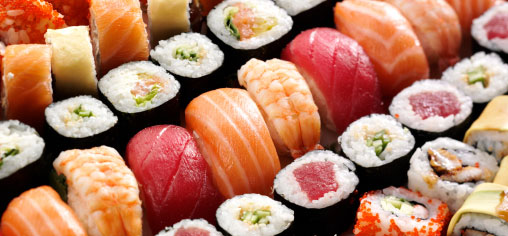Get an Education as Sushi Chef
Sushi is a highly specialized component of Japanese cuisine that is as much artistry as it is cooking. Professional sushi chefs require specialized training that stands alone, or augments general culinary arts education. Sushi has become a mainstream feature at restaurants andsupermarkets, where it may be prepared on site by grocery store sushi chefs.
Aspire to train as a sushi chef?
This highly stylized food form is quite elementary when it comes to ingredients. If you’ve ever sat at a sushi counter, then you’ve probably watched skilled sushi chefs create colorful dishes from a relatively sparse pool of simple ingredients.

Common ingredients used to create sushi rolls and sashimi:
- Fish, including tuna, salmon, eel, octopus, and halibut
- Rice, both brown and white
- Seaweed
- Caviar
- Avocado
- Asparagus
- Chilies
- Cucumber
- Crab
- Shrimp
- Tempura batter
- Pickled ginger
- Wasabi
- Soy sauce
Education for a Sushi Chef
Remember, this culinary art form is in high demand - no longer relegated to obscure California specialty restaurants, where sushi first gained notoriety in this country. Today’s professional sushi chefs are drawn from all backgrounds and ethnicities. The vocation is no longer limited to skilled practitioners fresh from Japan.
There are a couple of viable educational strategies for passionate would- be sushi chefs:
- Seek out a formal sushi chef academy—there are a few good schools stateside, and international opportunities exist in Asian countries. The number of educators is growing alongside the demand for experienced professional sushi masters.
- Pursue a traditional culinary arts degree, followed by professional courses in Asian cuisine and sushi arts.
Job Requirements for a Sushi Chef
Because the role of sushi chef is specialized, the skill set you’ll need to succeed in the field differs from other culinary positions. Prepare yourself for a career as a sushi chef with exposure to the following disciplines:
- Asian and/or Japanese cuisine
- How to make sushi rice
- How to handle knives
- Japanese seasonal ingredients
- Japanese sushi sauces
- Fish preparation
- How to make rolls
- How to slice, and present sashimi in its various forms (rolls, temaki, nigiri, sashimi, futomaki, etc.), including choosing ingredients, designing, and plating presentation
Other culinary strengths you’ll use in your role as a sushi chef:
- Innovative presentation
- Sushi station hygiene and sanitation
- Ability to take direction

- Ability to interact positively with the public
- Excellent communication and organizational skills
- Ability to work in a team environment
- Flexibility to work other kitchen stations like line cook or pantry chef
- Creativity to assist with menu creation.
Sushi Chef Employment
Salaries for sushi chefs fall across a wide range of earning potential, depending on a set of keyconditions. Highly skilled sushi chefs command higher salaries, which are commensurate with their particular mastery of this intricate, specialized culinary art form.
Professional sushi chefs now work in a variety of restaurant settings, and even grocery stores, so entry level opportunities exist for employment producing sushi. Don’t expect to draw the salary of a sushi master, without first logging some experience to hone your excellence. Factors that determine your wages as a sushi chef:
- Type of restaurant, kitchen or professional environment
- Your education
- Your culinary experience
- Your reputation
- Region
- Prevailing economic conditions
Expect to start your career with an hourly wage similar to that of a linecook. Refine your abilities up to master chef level, in order to draw a high salary.
California Sushi Academy - Los Angeles The most comprehensive option here is the intensive 12-week sushi chef training program that centers on masterful production of rolls, nigiri, sushi and sashimi. Japanese culture is embraced across a curriculum that also emphasizes food safety, sanitation and procuring sushi grade ingredients. Sake tasting and other exposure to ancillary Japanese preparations round out coursework that also touches on management principles.
A five-day intensive mode of study is also preparatory for work as a professional sushi chef, and offers the perfect specialized compliment to your general Culinary Arts Degree.
Tokyo Sushi Academy – Los Angeles
Dong-Won Asian Culinary School – Korea
Find A Culinary School in CT With Open Eligibility Today!
Types of Chefs
- Types of Chefs
- Commis
- Executive Chefs
- Food Stylist
- Line Cook
- Pantry Chef
- Pastry Chef
- Personal Chef
- Saucier
- Sommelier
- Sous Chef
- Sushi Chef
Culinary Training
Top Schools
- Culinary Arts Schools
- Le Cordon Bleu
- The Art Institutes
- Kitchen Academy
- Johnson and Wales
- International Culinary Center
Majors
- Culinary Majors
- Culinary Arts
- Baking & Pastry Arts
- Food Prep/Prof. Cooking
- Hotel & Restaurant Management
- Culinary Arts Management
- Wine, Spirits & Beverage Management

